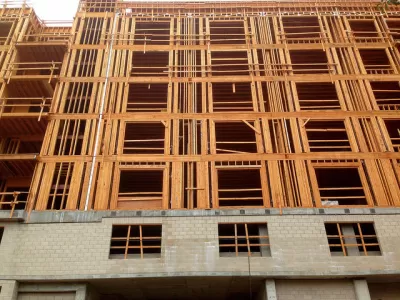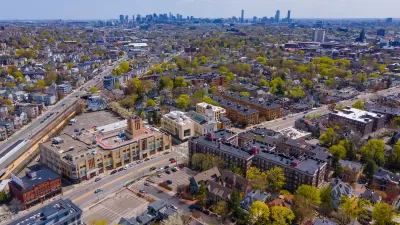Development impact fees in California triple the national average. A bill in the State Legislature would reform the state's development fees, as one measure in an effort to build more housing in the state.

A new study recommends reform for impact fees as a necessary step in response to the housing shortage and housing affordability crisis in California, according to an article by Louis Hansen.
The report [pdf], created by the Terner Center for Housing Innovation at the University of California, Berkeley and published on August 5, 2019 by the state Department of Housing and Community Development, will inform state legislators expected to debate the state's development fees.
"Cities depend on impact fees to build roads, schools and maintain parks and water systems," according to Hansen. "The money also allows municipalities to recoup costs for staff time spent on the projects. In an earlier study, Terner Center researchers found impact fees increased the cost of new units in some cities by up to 18 percent. California’s fees were nearly triple the national average."
"The report also recognized that California cities, limited in raising property taxes by Prop 13, lean heavily on impact fees to pay for services and upgrades to roads and utilities."
Assemblymember Tim Grayson, D-Concord, "plans to amend a bill on impact fee reform, AB 1484, to include recommendations from the report." The bill is on a tight schedule, according to the article—it has to get to Governor Gavin Newsom's desk by September.
Liam Dillon provides additional coverage of the report.
FULL STORY: California housing crisis: Development fees unpredictable, stifle construction

Alabama: Trump Terminates Settlements for Black Communities Harmed By Raw Sewage
Trump deemed the landmark civil rights agreement “illegal DEI and environmental justice policy.”

Planetizen Federal Action Tracker
A weekly monitor of how Trump’s orders and actions are impacting planners and planning in America.

The 120 Year Old Tiny Home Villages That Sheltered San Francisco’s Earthquake Refugees
More than a century ago, San Francisco mobilized to house thousands of residents displaced by the 1906 earthquake. Could their strategy offer a model for the present?

In Both Crashes and Crime, Public Transportation is Far Safer than Driving
Contrary to popular assumptions, public transportation has far lower crash and crime rates than automobile travel. For safer communities, improve and encourage transit travel.

Report: Zoning Reforms Should Complement Nashville’s Ambitious Transit Plan
Without reform, restrictive zoning codes will limit the impact of the city’s planned transit expansion and could exclude some of the residents who depend on transit the most.

Judge Orders Release of Frozen IRA, IIJA Funding
The decision is a victory for environmental groups who charged that freezing funds for critical infrastructure and disaster response programs caused “real and irreparable harm” to communities.
Urban Design for Planners 1: Software Tools
This six-course series explores essential urban design concepts using open source software and equips planners with the tools they need to participate fully in the urban design process.
Planning for Universal Design
Learn the tools for implementing Universal Design in planning regulations.
Clanton & Associates, Inc.
Jessamine County Fiscal Court
Institute for Housing and Urban Development Studies (IHS)
City of Grandview
Harvard GSD Executive Education
Toledo-Lucas County Plan Commissions
Salt Lake City
NYU Wagner Graduate School of Public Service





























